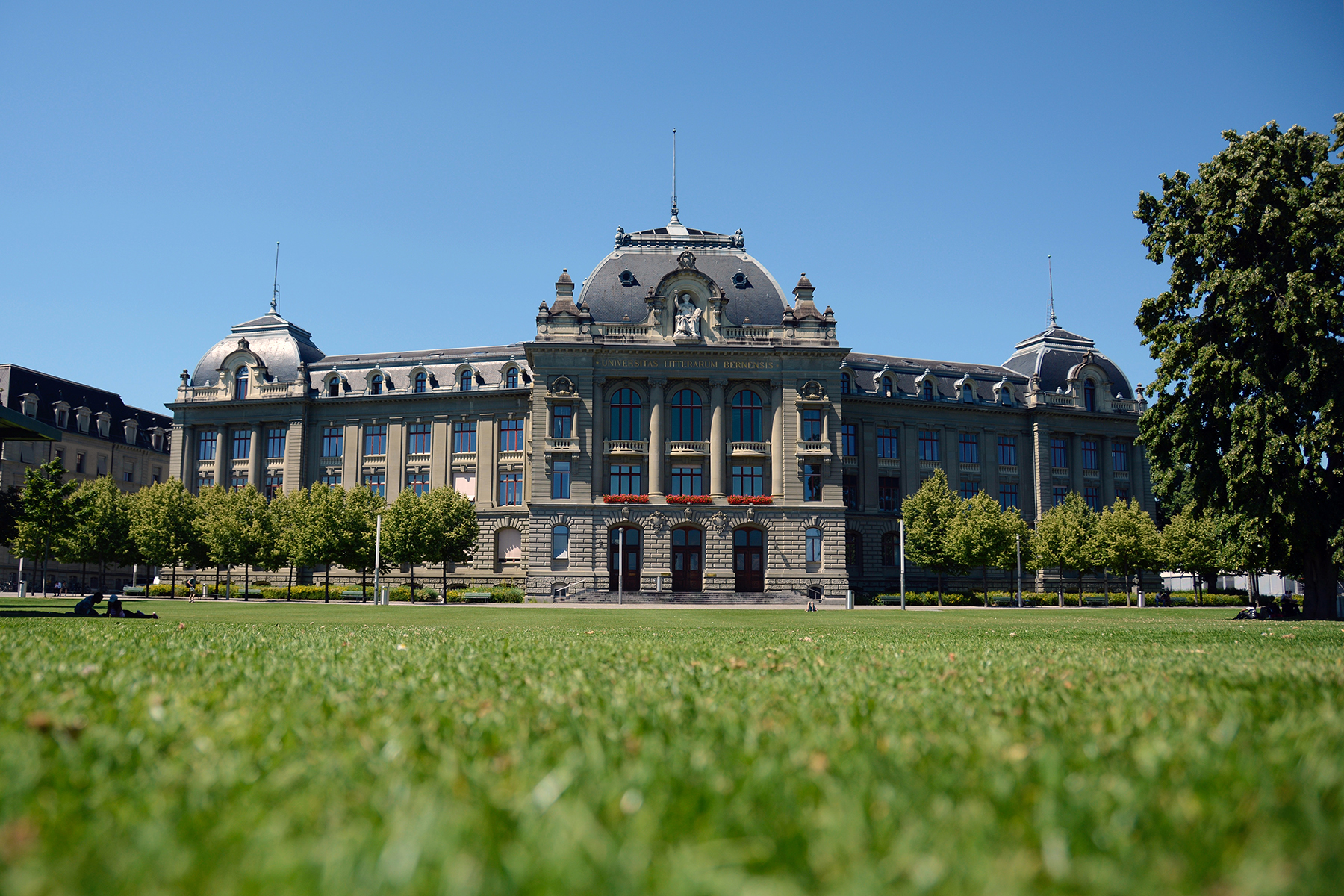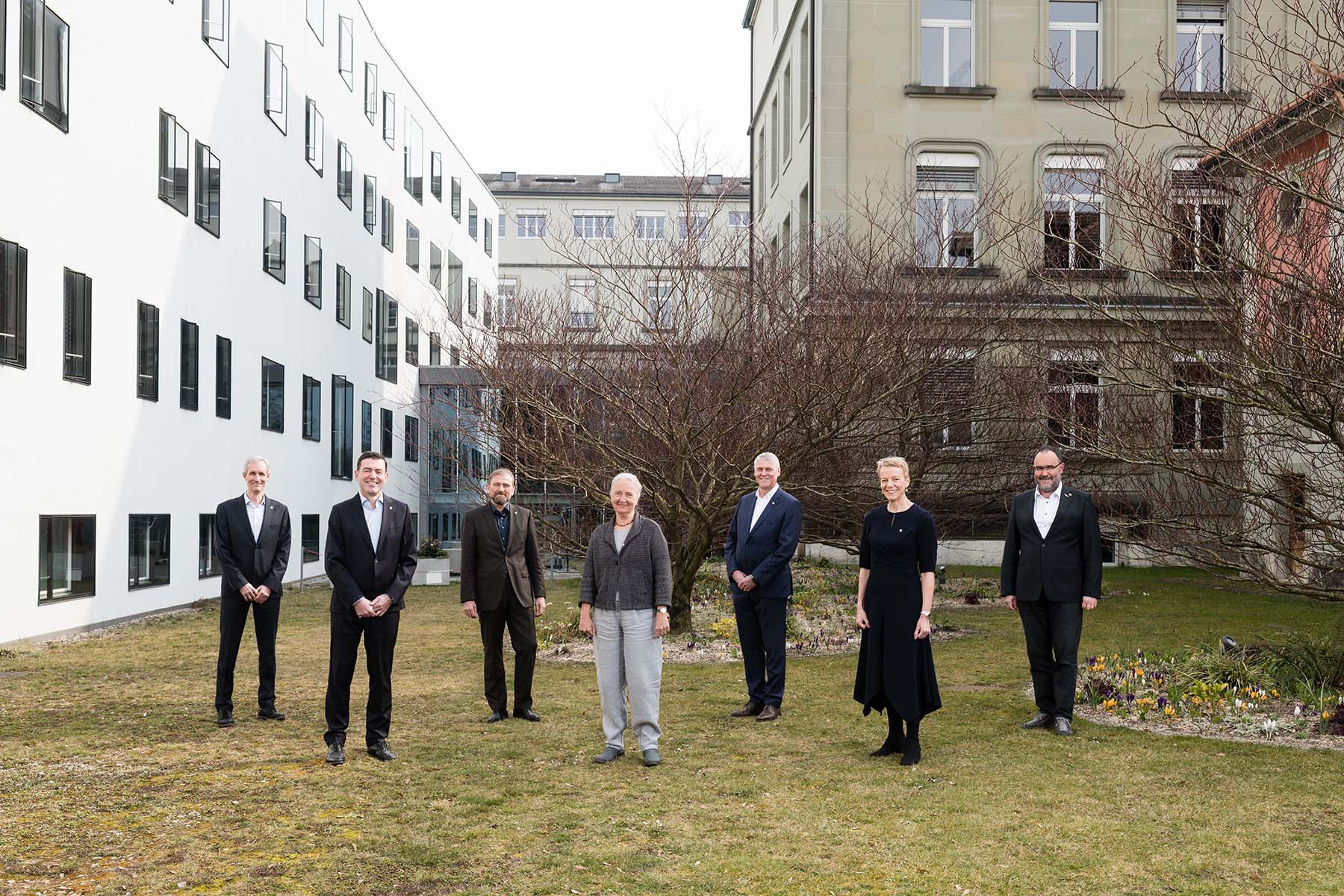“Welcome back” to the University of Bern
The University of Bern has also coped well with the second year of coronavirus and is welcoming students back in full in-person mode at the start of the semester. The certificate requirement will be extended to all courses at bachelor’s and master’s level from September 20, 2021. There are currently around 18,400 students enrolled, which represents a slight decrease compared to the previous year. New challenges arise from the construction situation of university buildings and Switzerland’s exclusion from the Horizon Europe research program.
The 2021 fall semester is starting again at the University of Bern in full in-person mode on Monday, September 20. To mark the occasion, “welcome back” activities are being held on the university campus: among other things, members of the university, including members of the university administration, will hand out apples to students – “for a good bite during the semester” (see info box below).
“We are an on-site university, and I am very happy to see our lecture halls filling up with life again,” says Rector Christian Leumann. “There are still too many students who have never seen the inside of their university. That’s finally over now!”. The health of all students and employees at the university has top priority. Currently, all activities at the University of Bern are subject to the certificate requirement, and this will also apply to courses at bachelor’s and master’s level from Monday, September 20. All members of the university will have free access to various testing facilities on campus starting in October at the latest. For the safety of students and lecturers, masks are still required indoors at the university. As a scientific institution, the University of Bern recommends vaccination to all its members.
In the last academic year, there were other pleasing events in addition to teaching, which worked very well despite the coronavirus: these included the University of Bern being among the leaders according to the WWF’s 2021 Sustainability Rating of Swiss universities. “The University of Bern and the canton can be proud of this excellent result,” says Silvia Schroer, Vice-Rector for Quality, who is responsible for integrating sustainability at the University of Bern. “With our commitment to research and teaching, and with the swift implementation of the stages on the path to becoming a climate-neutral university, we are showing that the entire university is very serious about making urgently needed changes – in deeds, not just words,” emphasizes Schroer.
The range of courses on offer has also been expanded to include two courses in the field of digitalization: a new master’s degree program on Artificial Intelligence in Medicine and a minor and doctoral degree program on Digital Humanities.
Around 2,400 first-year students
There are currently around 18,400 students enrolled at the University of Bern, which represents a decrease of about 600 students compared to the previous year. The number of applications for bachelor’s and master’s degree programs also fell slightly compared to the previous year: The University of Bern is currently expecting to welcome approximately 2,400 first-year students, in the fall semester of 2020 there were around 2,600 first-year students. In addition to those who are seamlessly transferring from a bachelor’s to a master’s degree program, almost 600 people are applying for a master’s degree program or returning to the University of Bern after a break in their studies. To date, there are applications from around 130 countries and the share of foreign students has remained constant at 13 percent. (All figures are a snapshot; the Admissions Office ZIB is still working on processing the applications.)
“The trend of constant increase in recent years has not continued this year, but it has stabilized at a high level,” says Fritz Sager, Vice-Rector for Teaching at the University of Bern. This speaks for the University of Bern’s very good reputation.
With around 3,600 students, the Faculty of Medicine remains the largest faculty, followed by the Faculty of Human Sciences and the Faculty of Science. In terms of faculties, most new students at bachelor’s, master’s and doctoral levels are interested in studying at the Faculty of Science.
The number of students spending one or two semesters at a foreign university is still at a low level due to the pandemic. For students who come to the University of Bern from abroad for one or two semesters, on the other hand, the numbers have almost returned to pre-pandemic levels (see Annex).
Good research and teaching need good infrastructure
The university’s new building at Murtenstrasse 24 to 28 in Bern was inaugurated on August 31, 2021. The new building on the edge of the Insel site creates synergies in the use of joint research structures and provides space for 400 employees in forensic medicine and biomedical research.
The Multidisciplinary Center for Infectious Diseases (MCID), which was founded in January 2021 with the help of the Vinetum Foundation, is also important for Bern as a medical center and is intended to contribute to the fight against this and future pandemics and epidemics.
The University of Bern was also pleased by the Executive Council’s decision to prioritize the building for medical teaching and research in the construction projects. On the other hand, the new buildings in dentistry and the veterinary hospital are to be postponed or not completed. However, Markus Brönnimann, Administrative Director of the University of Bern, still sees a great need for infrastructure to enable the University of Bern to fulfil its teaching and research remit in the long term. “First and foremost, the limitations that will now be placed on the veterinary hospital and dentistry are painful for us. The renovation of the buildings is essential. There is therefore still an urgent need to look for alternative solutions to finance the university construction projects that have not been prioritized,” says Brönnimann.
Horizon Europe program: Switzerland is losing its appeal as a research location
Christian Leumann, Rector of the University of Bern, is very concerned that Switzerland will continue to be treated as a non-associated third country in the EU’s Horizon Europe framework program for research and innovation. “This will have consequences for the University of Bern and all universities in Switzerland,” says Leumann, “consequences that are primarily of a long-term nature.” For example, Swiss researchers can no longer coordinate projects within the framework of Horizon Europe and no longer have any influence on determining future European research priorities. Switzerland is losing its appeal as a research location for excellent international students as well as for talented young researchers and also for those who are already established. “In addition, our own Swiss researchers could be increasingly enticed away,” says Leumann with concern. The European Horizon Europe research network is the largest in the world: “It cannot simply be replaced by other bilateral research collaborations,” Leumann stresses. Therefore, strong and lasting relations with the EU and quick association with Horizon Europe are needed.
From coronavirus variants to plastic waste
In addition to Bern’s coronavirus research, which included studies on various virus variants, long COVID or transmission between humans and animals, the successes of the CHEOPS space telescope and reports from climate research at the University of Bern attracted media attention. Among other things, CHEOPS discovered a unique planetary system, and there were new findings on global warming, which is already responsible for one in three heat-related deaths, and on coastal pollution of the world’s oceans by plastic waste.
“As was the case last year, our researchers on the subject of the coronavirus were in the frontline,” says Daniel Candinas, Vice-Rector for Research. “It is particularly gratifying that we continue to achieve excellence in medical, space, and climate research, and in many other areas, regardless of how challenging the circumstances are due to the pandemic.”
University of Bern welcome activities for the start of the semester from September 20-22, 2021The University of Bern will actually start its lectures again on site on September 20. This comes after the majority of the approximately 19,000 students had to attend online lectures. The University of Bern is using this occasion for welcome back activities: Apples will be distributed to students and other welcome back surprises will take place.
Media professionals are cordially invited to come and get an impression. |
2021/09/14



